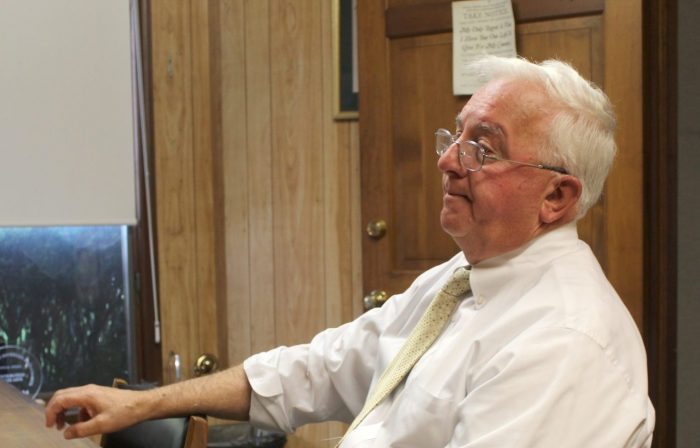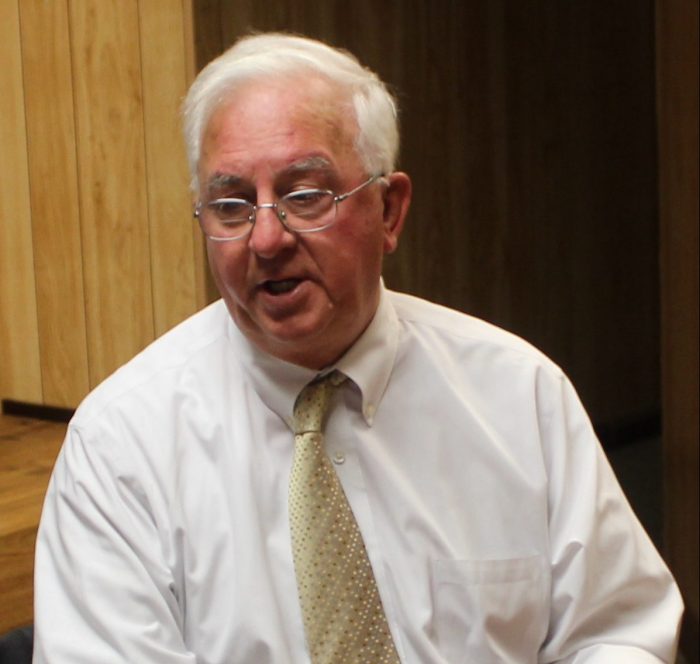The Suffolk County School Bus Safety Program has drawn scrutiny from Republican county officials targeting the program for alleged mismanagement.
Enacted unanimously by the county Legislature in 2021, this traffic safety program uses cameras attached near the stop arm of school buses to enforce the New York Vehicle and Traffic Law. The county has partnered with Virginia-based BusPatrol to operate the program.
Under state law, offenders caught passing buses while the stop arm is extended receive a $250 fine. The county code states, “net proceeds of any penalty … shall be expended for programs related to improving traffic safety and/or school district safety in Suffolk County.”
County Comptroller John Kennedy Jr. (R) recently announced his office is conducting an audit of the School Bus Safety program. He stated the program had captured his attention when numerous residents complained about receiving potentially erroneous violations.
“My interest in any program is always that a program is being operated as the laws that adopted it … sought to have it operate,” Kennedy said. “How is the revenue that’s being collected from the program being allocated? Is it being done under the terms of the contract? Is the vendor fulfilling all of their requirements?”
He added, “That’s the audit function, and it is universal across the board.”
Legislative purpose
Marykate Guilfoyle, a spokesperson for Suffolk County Executive Steve Bellone (D), summarized the motive for developing the program in the first place.
“The goal of the School Bus Safety program is to protect children as they get on and off the bus and to reduce the number of drivers illegally passing stopped school buses, which endangers the lives of students,” Guilfoyle said in an email. “The program is completely violator funded, and county proceeds are used to support public safety, traffic safety and school safety initiatives.”
County Legislator Kara Hahn (D-Setauket) defended the School Bus Safety program. She said her office’s most frequent complaints are related to roadway safety and other traffic concerns.
“Red light cameras and school bus cameras are a way to prevent death and injuries without needing a paid police officer at every intersection and following every bus,” she said. “It’s a very efficient way for providing the consequence for breaking the rules of the road.”
Before the program took effect, Hahn added, few violators ever got caught. Today, they receive a fine, incentivizing better roadway behavior and creating a safer traffic environment.
“Now people have to change their behavior to no longer do the illegal action that puts people’s lives at risk,” the county legislator said.
Questions over potential misapplication
County Legislator Rob Trotta (R-Fort Salonga) said the School Bus Safety program is one of the few measures for which he wishes he could rescind his “yes” vote. He said the Legislature was misled when the program was pitched.
Figures obtained by Trotta indicate the program grossed $23 million last year, with $13 million retained by the county and the outstanding $10 million collected by the vendor. Kennedy estimated the county government netted approximately $11 million.
“We don’t have all the net revenue,” Kennedy said. “That’s been another consequence of the hack” against the county government in September. For more on this ransomware event, see story, “Suffolk County cyberattack offers a window into the dangers of the digital age,” Nov. 17, also TBR News Media website.
By statute, the net proceeds generated by the School Bus Safety program must support various educational programs related to school bus and traffic safety. Asked how the revenue is being spent, an administration official said the 2022 revenue figures are still being finalized.
Guilfoyle, however, cited specific examples of how the revenue supports countywide traffic education initiatives: “Examples of the county’s efforts include dedicating more than $1 million to school districts and $125,000 in [public service announcements] during the back-to-school months to educate drivers on the state law surrounding stopping for buses.”
Trotta viewed the school bus program as a lucrative moneymaker for the county and vendor rather than a measure promoting bus safety. He said the law is applied unfairly, ticketing busy multilane corridors in the same manner as residential neighborhoods.
“I’ve checked with all the school districts, and kids aren’t crossing major thoroughfares,” Trotta said. “I’m all for giving a ticket to someone who passes a school bus on a residential avenue because it’s dangerous. I’m not at all for 1,000 people on Jericho Turnpike getting tickets.”
While the county code imposes rigid reporting requirements regarding expenditures of revenues generated from the program, Kennedy said he has yet to see any reports to date.
Competing perspectives
Following an initial spike when programs such as this are first instituted, Hahn said offenses start to wane “because people begin to change their behaviors — they stop at red lights because they’re afraid of getting a ticket.”
In time, the legislator added, drivers throughout Suffolk “will no longer go around stopped school buses,” but “if they choose to break the law, they will get tickets.”
Trotta said he is pushing to repeal the School Bus Safety program altogether. “The reality is it’s a sham, and it’s not what we were told it was going to be,” he said.
While Kennedy acknowledged the importance of traffic safety, he held that the audit is to determine whether the program is administered correctly.
“I never want to see somebody blowing a stopped school bus sign — it’s just heinous,” the county comptroller said. “But if [the program] is not being operated in a fair and proper and consistent manner by the school bus drivers and the vendor … then it’s a problem.”
Kennedy expects the audit to be finalized by the second quarter of 2023.








